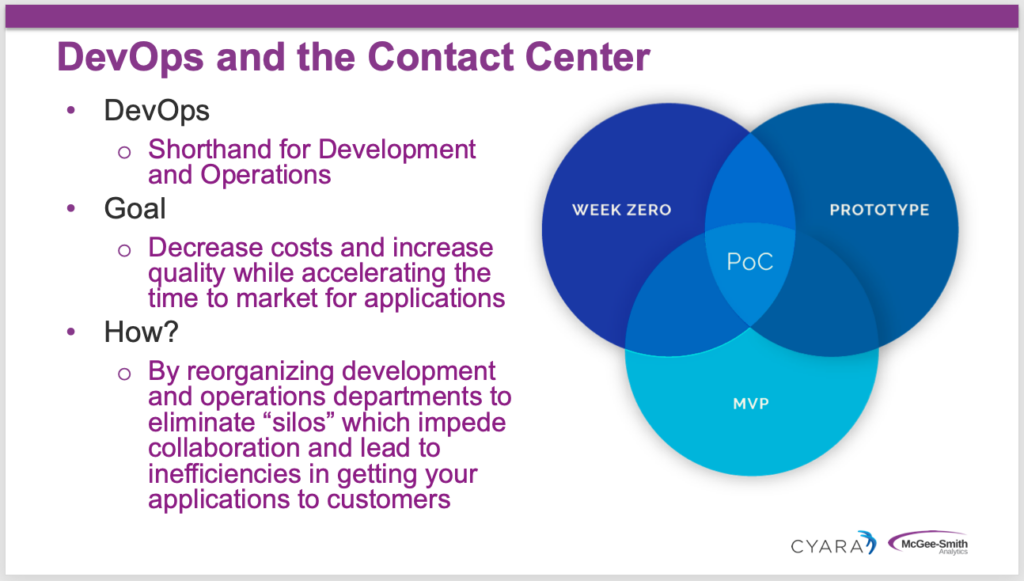As an increasing number of contact centers migrate to the cloud, another corresponding change is occurring. More and more enterprises have deployed dedicated developers to support their customer experience initiatives.

The Cloud and In-House Developers
Before the modern cloud, companies that wanted to integrate multiple customer care systems, e.g., the automatic call distributor and the customer relationship management (CRM) system, typically had to work with a combination of vendors, consultants, and systems integrators to get this done. For some broadly deployed solutions, e.g., Siebel CRM, a so-called out-of-the-box computer telephony integration (CTI) adapter might be available. But even then, costly and time-consuming professional services projects were required. As with many types of information technology (IT), there were times when CTI projects failed, and companies were left with expensive software that never really worked.
Cloud contact center solutions have brought many advantages, and one of them addresses this inability to integrate software easily. With the increasing availability of open application programming interfaces (APIs), in-house developers have become a vital part of the equation to allow companies to customize the contact center. Using common web-based frameworks rather than specialized, platform-specific proprietary skills, company developers are able to do today what in the past required time-consuming and expensive vendor professional services.
The possibilities go beyond just tying together a couple of pieces of enterprise software. A large and growing ecosystem of services is available, on-demand with elastic pricing. On-demand and elastic pricing mean only having to pay for what you need, and use, which lower risk. With these new services, enterprises have a choice of many solutions and platforms to mix and combine in new ways to deliver agile, innovative customer care.
Elevating the Role of Developer

As this new model of enterprise software emerges, the role of the developer in the contact center has been elevated. Working with line of business executives and IT, developers increasingly have a seat at the table to help drive customer experience innovation and corporate-level digital transformation initiatives.
In this new world of API-driven cloud contact center services, new types of projects are undertaken, and corresponding IT processes and practices are required. As seen in the graphic, companies are creating and evaluating pioneering approaches to customer care. From starting a new effort in week-zero to the rapid creation of a prototype, proceeding to deployment in a limited use case to a minimally viable product (MVP), and finally, a full proof of concept.
One executive I spoke to in 2018 said that its customer care developer team had defined 100 — inter-related, often cascading — projects at the beginning the year and by November had completed them all. Asked if some or all of these projects had eventually been deployed across the companies 15,000 agent population, the answer was a resounding yes. They were in the process of defining another 100 tasks for 2019.
Making this New Model Successful
While this all sounds like it enables a business to be much more responsive to customer requirements, these new practices raise questions as well. How costly will it be for companies to maintain and continue to innovate what are essentially custom solutions?
Part of the answer lies in bringing in-house the testing and evaluation platforms used by software developers in their businesses. Companies increasing the use of developers and DevOps practices in their operations also understand the need to ensure that new solutions are tested at scale and not just with a small sample data set. Software testing is becoming part of ongoing quality assurance practices.
In a recent webinar, Cyara’s Elizabeth Magill and I addressed contact center cloud migration and walked through the five top tips for being successful. If your company is considering the cloud for your next contact center solution, listen to the on-demand recording, which includes a discussion of the role developers, DevOps, and testing play in cloud migration. And if you are lucky enough to be heading to Cyara Xchange 2019 on October 21st, expect speakers like Joe Eisner from Amazon Connect to speak to the role developers are playing in the contact center.